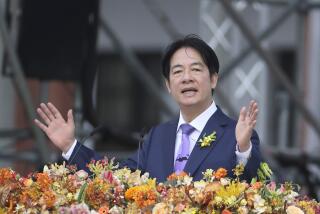More Intimidating Growls From Beijing : Tough talk on Taiwan poses a challenge to Clinton
- Share via
As Chinese officials continue to jockey to succeed the ailing Deng Xioping, Beijing is once again flexing its political and military muscles. Most recently Premier Li Peng repeated that China had not renounced the use of force to recover Taiwan, the Nationalist Party-ruled island off its southern coast. “ .J.J. In the final analysis,” he said, “we cannot promise to give up the use of force.”
Beijing’s intimidating talk, along with military exercises, may be designed to strengthen Li’s hand within China, but it also presents challenges to the Clinton administration in the handling of tricky Sino-U.S. relations. China’s strong words on Taiwan, for instance, are the latest in a series of events that are bound to undermine Beijing’s effort to secure a state visit to Washington.
The occasion for Li’s warning was the first anniversary of the release of Beijing’s eight-point plan for China-Taiwan reunification. The Chinese premier did not set out a timetable for reunification, as some had expected, but he did warn Taiwan against using its presidential election in March to promote the idea of political independence. Incidents last year that displeased Beijing led to Chinese military exercises in the Taiwan Strait and missile test firings close to Taiwanese shores. The State Department has informed Beijing that such exercises are not helpful to promoting peace and stability in the region. The United States is urging both sides to refrain from any actions that might increase tensions between themselves--and with the United States, which in mid-December sent the carrier Nimitz through the strait.
Washington has reiterated its commitment to a one-China policy, but under the Taiwan Relations Act, U.S. policy also is to “consider any effort to determine the future of Taiwan by other than peaceful means a threat to the peace and security of the Western Pacific area and of grave concern to the United States.”
Sino-U.S. relations are encountering other touchy issues as well. The Defense Department is reviewing, for the second time, the transfer of advanced telecommunications equipment to an American joint venture with the Chinese military. The concern is that the technology is being used to boost China’s battlefield communications capability. The Chinese recently requested that an assistant U.S. Air Force attache leave Beijing, which he did. And China has not yet decided whether to halt its nuclear testing program, the only one active since the French shut down their tests in the South Pacific last month.
In the diplomatic arena, the United States granted a transit visa to Vice President Lee Yuan-zu of Taiwan to visit three U.S. cities while traveling to and from Haiti. When a U.S. visa was granted to Taiwan’s President Lee Teng-hui last June for a personal visit to a reunion at Cornell University, Beijing condemned the action. It recalled its ambassador to Washington and staged military exercises in and around the Taiwan Strait.
The Taiwan situation is in many respects more troubling than U.S. sparring with Beijing over trade and human rights. China’s threat of using force, according to Jonathan Pollack, a China specialist at Rand Corp., requires sustained attention at high levels of the Clinton administration. Without a firm and thoughtful approach, President Clinton could face a bigger foreign policy challenge than Bosnia.
More to Read
Sign up for Essential California
The most important California stories and recommendations in your inbox every morning.
You may occasionally receive promotional content from the Los Angeles Times.










